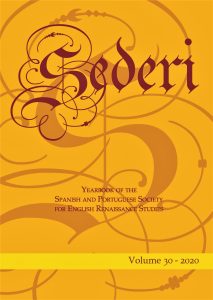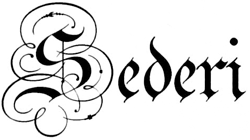
Sederi 30
Sederi 30 — 2020
EDITOR
Ana Sáez-Hidalgo
REVIEW EDITOR
María José Mora
ISSN 1135-7789
Sonia Villegas López, “Truth and Wonder in Richard Head’s Geographical Fictions.” SEDERI 30 (2020): 117–37.
DOI: https://doi.org/10.34136/sederi.2020.6 Download PDF
Abstract
In line with the method prescribed by members of the Royal Society for natural history and travel writing, Richard Head explored the limits of verisimilitude associated with geographical discourse in his three fictions The Floating Island (1673), The Western Wonder (1674) and O-Brazile (1675). In them he argues in favor of the existence of the mysterious Brazile island and uses the factual discourse of the travel diarist to present a semi-mythical place whose very notion stretches the limits of believability. In line with recent critical interpretations of late seventeenth-century fiction as deceptive, and setting the reading of Head’s narrations in connection with other types of travel writing, I argue that Head’s fictions are a means of testing the readers’ gullibility at a time when the status of prose, both fictional and non-fictional, is subject to debate.
Keywords: Richard Head; Brazile island; truth and wonder; deception in fiction
References
Adams, Percy G. 1983. Travel Literature and the Evolution of the Novel. Lexington, Kentucky: The University Press of Kentucky.
Bayer, Gerd. 2016. Novel Horizons: The Genre Making of Restoration Fiction. Manchester: Manchester University Press.
Behn, Aphra. 1994. Oroonoko and Other Writings. Edited by Paul Salzman. Oxford: Oxford University Press.
Blum, Elizabeth, and Paul Richard Blum. 2011. “Wonder and Wondering in the Renaissance.” In Philosophy Begins in Wonder: An Introduction to Early Modern Philosophy, Theology and Science, edited by Michael Funk Deckard and Péter Losonczi, 1–42. Cambridge: James Clarke & Co.
Carey, Daniel. 1997. “Compiling Nature’s History: Travellers and Travel Narratives in the Early Royal Society.” Annals of Science 54: 269–92.
Carey, Daniel. 2012. “Inquiries, Heads, and Directions: Orienting Early Modern Travel.” In Travel Narratives, the New Science, and Literary Discourse, 1569–1750, edited by Judy A. Hayden, 25–51. Aldershot: Ashgate.
Casaubon, Meric. 1668. Of Credulity and Incredulity in things Natural, Civil, and Divine. London: Printed by T.N. for Samuel Lownds.
Cavendish, Margaret. 1992. The Blazing World & Other Writings. Edited by Kate Lilley. London: Penguin.
Cervantes, Miguel de. (1605) 1998. Don Quijote de la Mancha. Edited by Alberto Blecua. Madrid: Espasa.
Congreve, William. 1692. Incognita: or, Love and Duty Reconcil’d. A Novel. London: Printed for Peter Buck.
Cormack, Lesley B. 1991. “‘Good Fences Make Good Neighbors’: Geography as Self-Definition in Early Modern England.” ISIS 82: 639–61.
Cressy, David. 2006. “Early Modern Space Travel and the English Man in the Moon.” American Historical Review 111 (4): 961–82.
Das, Nandini. 2016. “Romance and the Reinvention of Wonder in the Early Seventeenth Century.” In Seventeenth-Century Fiction: Text & Transmission, edited by Jacqueline Glomski and Isabelle Moreau, 19–33. Oxford: Oxford University Press.
Davis, Lennard J. 1983. Factual Fictions: The Origins of the English Novel. New York: Columbia University Press.
Dunton, John. 1683. The Informer’s Doom: Or, an Amazing and Seasonable Letter from Utoia, Directed to the Man in the Moon. London: Printed for John Dunton.
Freitag, Barbara. 2013. Hy Brasil: The Metamorphosis of an Island. From Cartographic Error to Celtic Elysium. Amsterdam: Rodopi.
Fuson, Robert Henderson. 1995. Legendary Islands of the Ocean Sea. Florida: Pineapple Press.
Glomski, Jacqueline, and Isabelle Moreau, eds. 2016. Seventeenth-Century Fiction: Text & Transmission. Oxford: Oxford University Press.
Griffin, Michael, and Breandán Mac Suibhne. 2006. “Da’s Boat; or, Can the Submarine Speak? A Voyage to O-Brazeel (1752) and Other Glimpses of the Irish Atlantis.” Field Day Review 2: 111–28.
Hayden, Judy A. 2012. “Intersections and Cross-Fertilization.” In Travel Narratives, the New Science, and Literary Discourse, 1569–1750, edited by Judy A. Hayden, 1–21. Aldershot: Ashgate.
Head, Richard. 1663. Hic & Ubique, or the Humours of Dublin. A Comedy. London: Printed by R.D. for the author.
Head, Richard. 1665. The English Rogue. London: Printed for Henry Marsh.
Head, Richard. 1666. The Red-Sea: Or the Description of a most Horrid, Bloody and never yet paralel’d Sea-Fight between the English and the Dutch. London: Printed by Peter Lillicrap.
Head, Richard. 1667. The Life and Death of Mother Shipton. London: Printed for B. Harris.
Head, Richard. 1673. The Canting Academy, or, the Devils cabinet opened, wherein is shown the mysterious and villainous practices of that wicked crew, commonly known by the names of hectors, trapanners, gilts, & c. London: Printed by F. Leach for Matt Drew.
Head, Richard. 1673. [Franck Careless] The Floating Island: or, A New Discovery, Relating The Strange Adventure on a late Voyage, form Lambethana to Villa Franca, alias Ramallia, To the Eastward of Terra del Templo. London: s.n.
Head, Richard. 1674. The Western Wonder: or, O Brazeel, and Inchanted Island discovered; with a Relation of Two Ship-wrecks in a dreadful Sea-storm in that discovery. London: Printed for N.C.
Head, Richard. 1675. O-Brazile or the Inchanted Island, being a perfect Relation of the late Discovery, and wonderful Dis-Inchantment of an Island on the North of Ireland: With an Account of the Riches and Commodities thereof. Edinburgh: Printed for William Crook.
Johnson, Donald S. 1999. Phantom Islands of the Atlantic: The Legends of Seven Lands that Never Were. London: Souvenir Press Limited.
Katanka, Margaret Claire. 1975. Richard Head (1637?–1686?): A Critical Study. Ph.D. diss. University of Birmingham.
Loveman, Kate. 2008. Reading Fictions, 1660–1740: Deception in English Literary and Political Culture. Aldershot: Ashgate.
Manley, Delarivier. 1705. The Secret History of Queen Zarah and the Zarazians; Being a Looking-Glass for ——- in the Kingdom of Albigion. Albigion.
Matytsin, Anton. 2013. “Scepticism and Certainty in Seventeenth- and Eighteenth-Century Speculations about the Plurality of Worlds.” Science et Esprit 65 (3): 359–72.
McKeon, Michael. 1987. The Origins of the English Novel, 1600–1740. Baltimore: The Johns Hopkins University Press.
Moreau, Isabelle. 2016. “Seventeenth-Century Fiction in the Making.” In Seventeenth-Century Fiction: Text & Transmission, edited by Jacqueline Glomski and Isabelle Moreau, 1–16. Oxford: Oxford University Press.
Salzman, Paul. 1985. English Prose Fiction, 1558–1700: A Critical History. Oxford: Clarendon.
Salzman, Paul. 1999. “Theories of Prose Fiction in England: 1558–1700.” In The Cambridge History of Literary Criticism. Vol. III. The Renaissance, edited by Glyn P. Norton, 295–304. Cambridge: Cambridge University Press.
Sell, Jonathan P. 2006. Rhetoric and Wonder in English Travel Writing, 1560–1613. Aldershot: Ashgate.
Shapin, Steven. 1988. “The House of Experiment in Seventeenth-Century England.” Isis 79 (3): 373–404.
Shapin, Steven. 1994. A Social History of Truth: Civility and Science in Seventeenth-Century England. Chicago: University of Chicago Press.
Tieje, Arthur Jerrold. 1913. “A Peculiar Phase of the Theory of Realism in Pre-Richardsonian Fiction.” PMLA 28 (2): 213–52.
